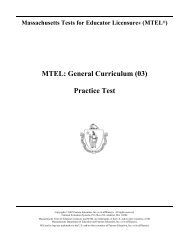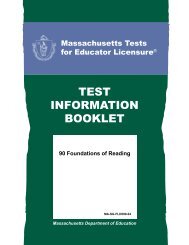MTEL Communication and Literacy Skills (01) Practice Test
MTEL: Communication and Literacy Skills (01) Practice Test - MTELs
MTEL: Communication and Literacy Skills (01) Practice Test - MTELs
- No tags were found...
Create successful ePaper yourself
Turn your PDF publications into a flip-book with our unique Google optimized e-Paper software.
<strong>Communication</strong> <strong>and</strong> <strong>Literacy</strong> <strong>Skills</strong> (<strong>01</strong>) <strong>Practice</strong> <strong>Test</strong>: ReadingMULTIPLE-CHOICE QUESTIONSRead the passage below, written in the style of a magazine of ideas <strong>and</strong> opinion.Then answer the five questions that follow.A Native American Heritage1 By the beginning of the twentieth century,the Native Americans who lived in NewEngl<strong>and</strong> were far fewer than had lived in theregion three centuries earlier. Many of thesepeople lived in small groups on portions ofl<strong>and</strong>s that their ancestors had long occupied.Though fewer in number, they honored theirtribal identities, cherished their ancestralhomel<strong>and</strong>s, <strong>and</strong> wanted to keep what theyhad. To help insure their heritage, NativeAmericans eventually turned to the U.S. legalsystem.2 Leading the way were two Maine tribes,the Penobscots <strong>and</strong> the Passamaquoddies,whose history differed little from that of mostNative Americans of the region. Like othertribes, their populations had decreasedmarkedly over the centuries; so had theamount of l<strong>and</strong> they controlled. After theAmerican Revolution, state governments hadimposed treaties that transferred much of theNative Americans' l<strong>and</strong> to state <strong>and</strong> privateownership. With the loss of their l<strong>and</strong> base<strong>and</strong> its resources, tribal populations tended todisperse as individuals sought opportunitieselsewhere. In Maine, by the early twentiethcentury, the Penobscots <strong>and</strong> Passamaquoddiesheld only two small reservations.3 Thus matters stood for the next halfcentury.Then, in 1957, a federal programdesigned to encourage the assimilation ofNative American peoples threatened toterminate the Penobscot <strong>and</strong> Passamaquoddytribal governments. Tribal leaders resisted.With the help of other Native Americanactivists, they thwarted the attempt <strong>and</strong> in theprocess strengthened tribal authority. It was asmall victory, but one that encouraged them toseek other ways of asserting their rights.4 As the changing social <strong>and</strong> politicalclimate of the 1960s <strong>and</strong> 1970s promptedmany Native American groups to insist thatthe federal government live up to treatycommitments, Penobscot <strong>and</strong> Passamaquoddyleaders saw their opportunity. The tribes hadfought for the Americans in the Revolution<strong>and</strong> in return had been promised protection oftheir hunting grounds by the ContinentalCongress. By the twentieth century, thosevast tracts had become extremely valuable.So the two tribes decided to sue the federalgovernment for the return of about two-thirdsof the state of Maine.5 The l<strong>and</strong>, they claimed, had been takenillegally, first by Massachusetts (of whichMaine formed a part until 1820) <strong>and</strong> then byMaine. They based their case on the IndianTrade <strong>and</strong> Intercourse Act of 1790. That law,which made the federal government a trusteefor Native American property, declared that notransfers of Indian l<strong>and</strong> were valid unlessapproved by Congress. Since the tribes coulddemonstrate that state treaties involving morethan 1,200,000 acres of l<strong>and</strong> taken from themhad never been submitted to Congress, theyhad a strong case. Much to the surprise <strong>and</strong>chagrin of many observers, the suit provedsuccessful. In 1980, the Maine IndianSettlement Act awarded the tribes a substantialmonetary settlement that enabled them to buyl<strong>and</strong>, develop tribal businesses, <strong>and</strong> provideemployment for tribal members.7
















